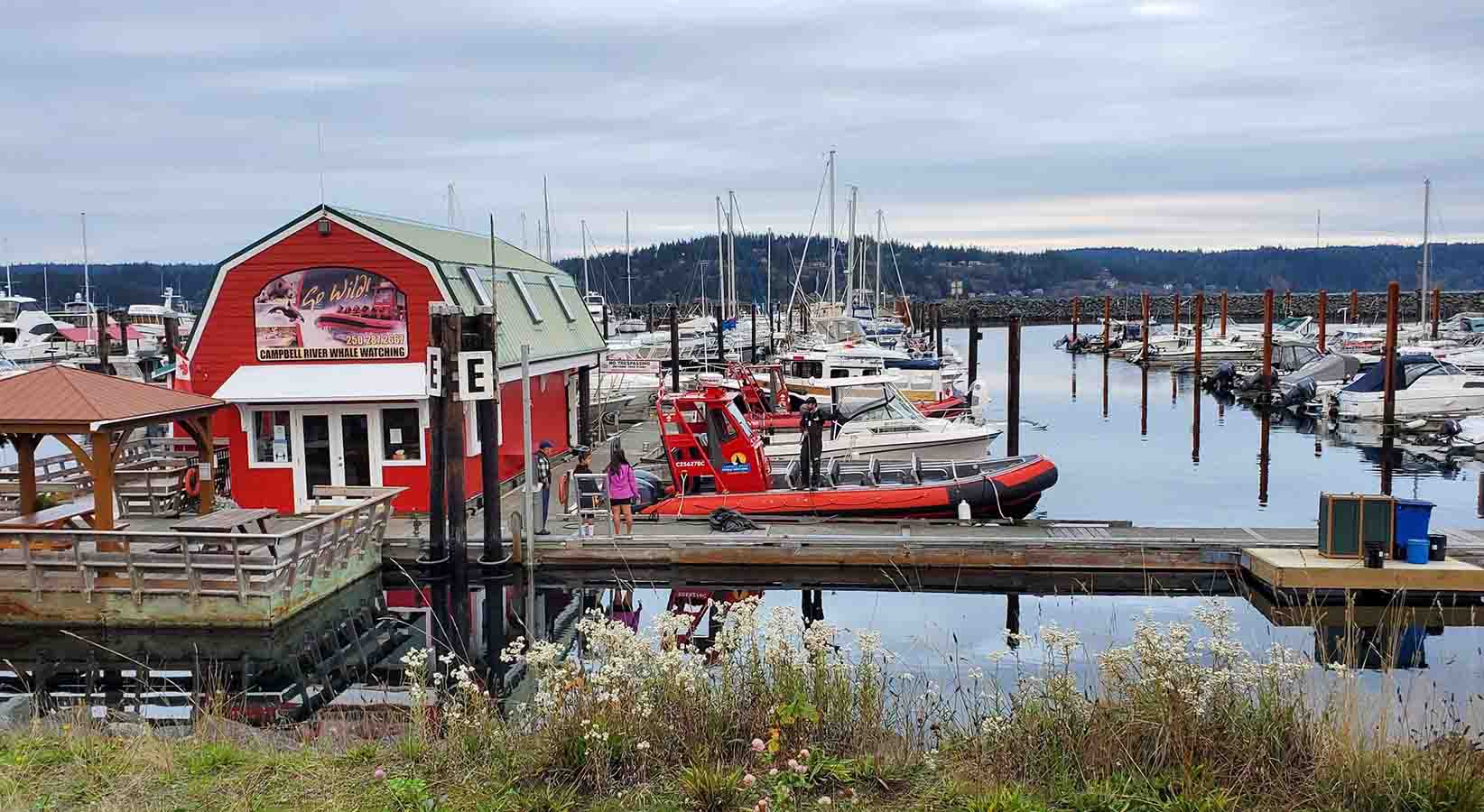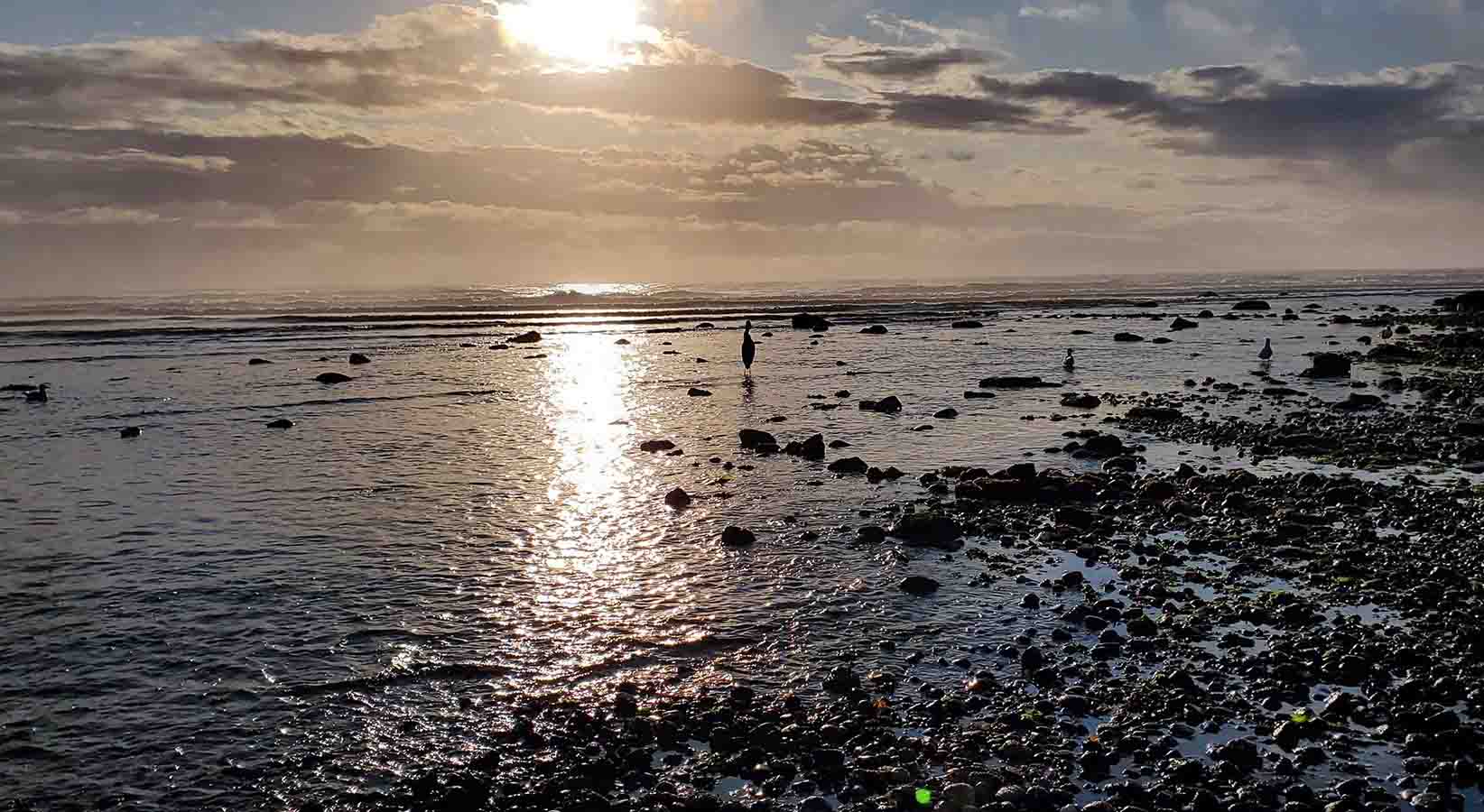Campbell River

by Kat Eddy, Campbell River Community Literacy Association
A Year Like No Other — Impacts of a Pandemic on Food Service Industry Employees
March 2019
Daily postings of summer employment opportunities in the community of Campbell River, BC spring to life in late March to early April on the local Work BC-North Island Employment Foundation job bank.
“Small northern fishing resort seeking seasonal food server, cook, housekeeper for the 2019 summer fishing season…”
“Hiring Fair for summer season at Painter’s Lodge/April Point. All positions…”
“Local restaurant seeks full-time line cook, hostess, front of house food servers…”
“Wildlife tour company seeking experienced, ticketed deck hand for summer season.”
“Local hotel seeking night auditor, housekeeping staff, line cooks please bring resume to…”
Conversations on the docks focus on getting the boat ready, fully booking fishing charters, what salmon species runs are looking best this year and the newest rendition of regulations mandated by the Department of Fisheries and Oceans. Water taxi companies are booking supply runs to remote camps. The marine maintenance industry is going full tilt as individuals and businesses re-launch their boats and ready them for summer tourism season. Local fishing supply stores have stocked their salmon summer tackle inventories with names like hoochies, flashers and plugs – the best equipment for catching that prized fish. The excitement of another great season welcoming visitors from all over the world is almost palpable.
It typically begins with a trickle about mid-May, with a few US retirees touring around Vancouver Island accessing the local ice cream shop on the pier, picking up seafood at the local fish monger, and stopping by local restaurants to dine. Some visitors come equipped with their massive motorhomes and start to fill the local RV parks, while others arrive by boat. You can see a vast array of international flags bobbing in the local marinas. Others rent cars and cruise around the Island, stopping at all of the touristy spots. As a local, you notice a bit more activity downtown, traffic is a bit heavier, and the highways are full of RV’s and rental cars. It’s the beginning of the Campbell River/Northern Vancouver Island tourist season.
The Discover Campbell River travel and tourism office is abuzz with phone and email inquiries. Some of the popular hiking trails, beaches and gift shops are starting to get busier. The whale watching companies, local museum and most businesses are now open seven days a week. The Downtown Business Association has planted beautiful gardens. The local arts and music scenes are scheduling and promoting the Thursday evening free community shows. It seems every weekend has some kind of event happening downtown. All the storefronts are putting on their best displays looking to attract the tourists that will likely carry their small businesses through leaner winter months.
Local restaurants are bringing in more staff to meet the crazy dinner and lunch rushes that are happening every day now, not just on Fridays and Saturdays. They advertise live music and local seafood, hoping to attract some of the tourists that by late June regularly flood into town. Locals begin to take the back way in order to avoid travel through the downtown core with its crowded sidewalks and busy traffic. The BC Ferries routes require a reservation if you need to travel by boat without a wait. Hotels and resorts are now charging their summer rates, although locals know if they wait until early October, they’ll get a much better deal. Instead, they pack up their own motorhomes, launch their own boats and venture into the wilds of Northern Vancouver Island. They’re headed to the secret spots that Discover Campbell River doesn’t promote, the spots where locals like to spend their two weeks of vacation around a campfire.
It is another summer season in Campbell River, not unlike any other — busy, fun, and overrun by visitors. These are the months that many local businesses have prepared for all year, the short four months where the beauty of their community will help them generate enough income to make it through the rest of the year. They are ready and are welcoming, creating a hometown atmosphere for those who have travelled to enjoy the season.

March 2020
“We need to work together to slow the spread of Coronavirus…”
I go to work on a Friday evening at my part-time “fun job” serving in the public house attached to the local casino. This is a pretty new spot here in Campbell River, having been open about two years. The casino gaming floor adjacent is a local hotspot and it is busy there every night with an always interesting mix of locals and visitors. The public house/gaming floor is brand new, and well run. It employs over 70 local folks in a variety of positions related to gaming and food service. The staff is a diverse mix of mostly career food servers and kitchen staff, and some young employees just starting out in the industry who are saving for education or their first apartment. The casino floor is staffed by a large number of middle-aged folks for whom Canada is not their first home. I often see these same people working a second job in fast food, grocery or retail and know a number of them personally as they have accessed language services through our organization – The Campbell River Literacy Association. Working here is a good service job, as it is a busy and popular venue, offers full time employment at a decent wage and provides health benefits for families.
Just down the main street is another restaurant — much different in scale — a family owned business catering to the breakfast and lunch crowd with good hearty homemade meals and a discount for seniors. The breakfast crowd is always brisk and at lunch it can be difficult to find a seat. The employees there are much older, many at the end of their service careers, displaying a slight limp and producing a pad of paper for writing down your order. The owner of this business cares deeply for her employees and will go out of her way to ensure they have what they need to survive. For a lot of these folks this is just that, a survival job in an industry they have worked in for decades. It’s not, ‘let’s save for school’ or ‘make great tips’ work in a fast-paced, modern, large scale food service operation. This is employment that keeps them one step from the street or living with family. Many are in their late 50s and early 60s. A large proportion of the front of house workers are women, with an equal divide of mostly men in the kitchen. Most have minimal access to retirement programs like Canadian Pension Plan (CPP) because they have always worked in minimum or below wage jobs. Maybe they can slow down when they reach 65 and old age pension begins? The owner of this business has been struggling for the last couple of years, but she keeps her doors open because where would her family of loyal, loving employees go?

Mid March 2020
“The federal government announces a complete business shutdown to flatten the curve of admissions to hospitals due to the spread of Covid-19.”
The atmosphere at the public house is strained – business is not as usual. The casino floor emits its still excited beeps and buzzes but there seem to be fewer and fewer folks coming in. We’ve been hearing the whispers of a lockdown from the federal government but no one really understands what that means. The general manager of the building informs staff that although she doesn’t really know what the future holds, it looks like she’s going to have to close the doors for a couple of weeks. There’s a sense of confusion and panic rippling through the full-time staff who rely their incomes to pay rent, feed families and pay bills.
“What do you mean shut down? We don’t even close on Christmas Day.”
Management promises to keep everyone informed as they await further direction from the corporate team, but it seems like a closure is inevitable. Shifts are cut, hours are shortened and, within days all staff are informed that until further notice the business will be shuttered. Not enough notice to stockpile some of those tips you made last month, and you were counting on a good weekend to gather together the last couple hundred dollars you need for rent.
There is no working from home for this industry, and no moving it to an online environment. You go home hoping your landlord will understand that rent this month will be a bit late and that BC Hydro knows you will get that payment to them as soon as you can. And you watch – you watch national news to see what the federal plan is and you watch the numbers of active cases rise higher and higher. The Coronavirus has been renamed COVID-19 and it looks like we’re in for the long haul – this isn’t going to be a short-term closure. You worry, you hug your kids close and you hope that things will work out and your workplace will re-open soon, because what are your options? You really don’t have many other skills. You’ve worked in the food service industry for 30 years, starting as a dishwasher in Grade 10, moving up to full-time at the end of Grade 11 when school wasn’t really working out for you. You worked hard, learned a lot about the industry, customer service, safe food handling, balancing an evening work schedule and raising your kids. But you really haven’t learned how to make a living from your computer at home. You just bought one last year for your Grade 6 daughter because she needed it for school. You watch the news alerts on your phone, and you wait.
Down the road at the much smaller family-run restaurant, the big-hearted owner is reaching out to other restaurants, spending hours on the Canada.ca website, speaking to friends in other industries and trying to make sense of what each new announcement means to her business. In two weeks sales drop by over 60 percent.
She worries about the most recent delivery from her food supplier and all that fresh produce. How is she going to pay for it with no sales?
How is she going to cover the payroll this period?
What will she tell her aging staff as they worry about whether or not there will be a job at the end of this week?
She sifts through wage subsidy information. Do we qualify?
Should she talk to her landlord?
CERB? Canadian Emergency Response Benefit? What will my employees need to access this?
Where is Joe? The 87-year-old senior that comes in everyday at 11 am for the soup of the day. She always gives him a bit extra because she suspects this could be the only meal he eats.
What about her own mortgage?
What will her family do if there is no income from the business? She can’t just roll up her sleeves and work harder to earn some extra income. There is no business.
She makes the decision that she cannot afford to stay open. Every day she is bleeding money and she knows she will not be able to make payroll. She pulls together her staff – her family, and delivers the news. There are tears, there is anger, there is fear.
She tries to explain, as well as she can, the CERB program, letting them know she has already contacted the bookkeeper and that their Records of Employment will be issued as soon as the end of the final business day. Eighty percent of her employees come to her for help. They don’t have computers, don’t know how to use one, and many are barely literate. They need to have this money because they don’t have any savings. There’s not a lot of food in the cupboard, as they were waiting to shop after payday. They usually eat at work where she allows them to run a tab. She spends the next three business days clearing her coolers of fresh food, freezing what she can and creating take home food care packages for all her staff. She then spends long hours into the night trying to navigate the Employment Insurance website trying to access benefits so she can help her staff fill out the forms for the emergency money to carry them through. She knows she must help her staff with the government forms because no other businesses are allowing people in for help. She knows if she doesn’t help this family of hers will be hurt more than most Canadians. They do not have the technology and literacy skills to self advocate, and no one is answering any phones.
Her bank accounts are in the negative, because she’s tapped everything accessible to cover payroll and pay out any vacation pay. On her final day of business there are no customers – hers is one of the last restaurants to close. People have begun to shelter in their homes, the grocery store shelves are pretty bare, and the downtown streets of this busy tourist town are eerily quiet. She closes earlier than usual, hugs all her staff, and for those who she hasn’t yet helped fill in the forms, makes appointments to meet at her house the following week. She then locks the front door – perhaps for the last time. She thinks to herself as she walks to her car, “I hope that old Joe will be OK without us for a while – maybe forever.”
Afterward from the author
This piece was written as a true-to-life narrative and the choice to end at the closure of business due to COVID was intentional. Part two continues to evolve as the fall season begins and businesses in the travel and tourism industry continue to falter. It is hoped a more optimistic piece about recovery and a return to normal is still to be written.
The year 2020 has highlighted the vulnerabilities of those individuals working survival jobs. Those folks are everywhere in our cities and towns. Perhaps it has taken something as extraordinary as a global pandemic to gain a shared empathy for the fragility of opportunity when safety nets surrounding us and our families weaken. We are all experiencing a shared trauma that those living with lower literacy and essential skills face every day. Absence of choice, financial worry, fear, a lack of understanding, inability to plan for the future, few resources for self-advocacy, frustration with complex ever-changing systems, and a constant struggle to survive on unsteady ground have challenged most. This is our shared experience – for a time – but 42% of our society experiences these limitations every day.
As we adjust to the innovations helping us navigate these times, find hope in overcoming the challenges we face, and restart our normal lives, I hope we do not lose the compassion gained by walking a mile in someone else’s shoes.

About the author
Kat Eddy moved to the community of Campbell River, located on the mid-eastern shore of Vancouver Island in late summer 2002. Her first employment opportunity was in the food service industry at a long standing, popular, and family owned pub/restaurant. She has continued to work part time and seasonally in the local travel and tourism field throughout the last 18 years and reflects often on the changes of an industry now at the forefront of the economic development plan for her region.
Professionally, Kat Eddy is the Executive Director of the Campbell River Literacy Association and has worked in the field of adult education for over 10 years. This work has served to enlighten her to the challenges faced by adults with low essential skills as they access employment and education opportunities, interact with ever changing technology and self advocate for services at all levels for both themselves and their families.